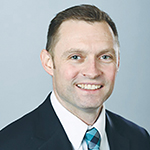CHA has launched a new Theology & Ethics Center to help Catholic health care systems and facilities address complex issues that arise as they pursue their mission. The association has named ethicist Daniel Daly as the center's inaugural executive director.
 Daly
Daly
Over the coming year, CHA will form an advisory board and develop an operational plan for the center. The vision is for it to foster dialogue, encourage faithful and creative scholarship, and provide consultation around pressing theological and ethical concerns.
CHA President and CEO Sr. Mary Haddad, RSM, said that with increasingly complex moral and ethical issues faced in the delivery of health care, "our members recognized an opportunity for CHA to provide in-depth theological study to these emerging ethical issues to help guide Catholic health care through these challenging times."
"We have the ability to bridge the clinical and ethical realms of care in a practical manner," she said.
Practical experience, scholarship
Sr. Mary said CHA leadership and members developed the idea for the center after identifying a gap in theological and ethical discourse. Because most U.S. ethics centers are run by universities, they tend to have an academic rather than practical focus. "We believe that the uniqueness of this center will be our ability to bring together the practical experience of health care with strong theological scholarship," she said. "This approach will better inform our work."
To develop the plan for the center, CHA has been engaging internal and external stakeholders. This includes top executives, ethicists and clinicians with ministry systems and facilities; university professors; directors of Catholic bioethics centers; and staff of the United States Conference of Catholic Bishops. The advisory board CHA is assembling will be comprised of theologians, clinicians, bishops and other experts.
Sr. Mary noted that especially given the focus on practical application of theological concepts, CHA member engagement will be critical to the center's development and ongoing operations. "This center will allow us to delve deeper into the complex issues challenging Catholic health care today with theological rigor," she explained. In addition to working closely with members, CHA plans for the center to form a network with Catholic theology schools and bioethics centers.
This broad group of experts will seek to advance the ministry in the U.S. and strengthen one another's work. Sr. Mary said, "The 'We' in CHA's vision statement is the recognition that the Catholic health ministry cannot do this work alone." The vision statement, which CHA announced in the summer, is "We will empower bold change to elevate human flourishing."
New technology, new challenges
Sr. Mary said given the rate of scientific advances and introduction of new technology, "I am certain that the center will not be at a loss for subject matter." For instance, the use of artificial intelligence and DNA editing are among emerging technologies that hold both great promise and great potential ethical concern. "It is our moral obligation to ensure that new technologies are ethically and responsibly used to promote human dignity and ensure the common good so that all may flourish," she said.
Daly joins CHA from Boston College School of Theology and Ministry, where he is finishing out the academic year as an associate professor of moral theology. Prior to his tenure at Boston College, he was an associate professor at Saint Anselm College in Manchester, New Hampshire. He authored the book The Structures of Virtue and Vice, has written numerous journal articles and has presented at multiple conferences. He was a member of CHA's Theology and Ethics Committee from 2015 to 2021.
Daly said he welcomes the opportunity to contribute in a more direct way than he has in the past to the mission of the Catholic health ministry.
He said he will prioritize listening to the center's stakeholders to gain a thorough understanding of their perspectives. He noted that Pope Francis recently has emphasized the importance of people engaging across disciplines to learn one another's viewpoints. Daly said that in the tradition of St. Thomas of Aquinas, he believes the center will be able to serve as a "venue for the inclusive, free exchange of ideas," where all input is taken seriously and scrutinized.
"Debate helps us develop and sharpen our perspectives," he said.
He said the center's success will be predicated upon its ability to respond to the needs of many ministry constituents and partners, including ministry patients and providers, bishops and organizations that work with the ministry.
He said the center "will help shape the discourse of Catholic health care" with the goal of ensuring patients and staff and community members are nourished and their dignity promoted.